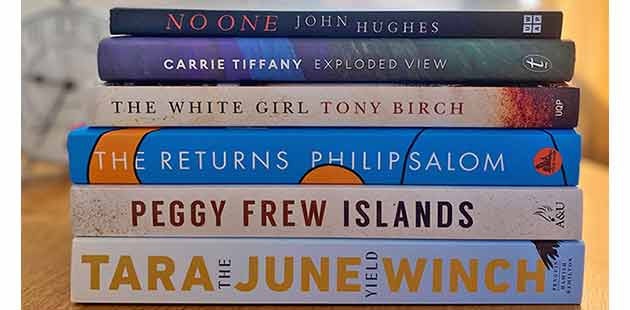 The Copyright Agency’s Cultural Fund, alongside Perpetual, the trustee of Australia’s most prestigious literary awards, have announced the six talented authors who have been included in the 2020 Miles Franklin Literary Award Shortlist.
The Copyright Agency’s Cultural Fund, alongside Perpetual, the trustee of Australia’s most prestigious literary awards, have announced the six talented authors who have been included in the 2020 Miles Franklin Literary Award Shortlist.
The Miles Franklin Literary Award was established by prolific author and feminist Stella Maria Sarah Miles Franklin, now best known for her first novel My Brilliant Career. First presented in 1957, the Award celebrates novels of the highest literary merit that tell stories about Australian life. Winning authors receive a prize of $60,000. The award remains Australia’s most prestigious and valued literary award.
This year’s list showcases a powerhouse of experienced Australian literary talent all vying for the prestigious $60,000 prize. The nominees include four previously Miles Franklin-shortlisted authors: Tony Birch, who was nominated for Blood (2012), and whose latest work The White Girl won the NSW Premier’s Award for Indigenous Writing; Peggy Frew, who was shortlisted for both the Miles Franklin and the Stella Award for Hope Farm (2016).
Philip Salom, whose novel Waiting (2017) was shortlisted for the Miles Franklin Award, the Prime Minister’s Award and the Victorian Premier’s Prize; and Carrie Tiffany, whose novels Everyman’s Rules for Scientific Living (2006) and Mateship with Birds (2013) were both shortlisted for the Miles Franklin.
Newcomers to the Miles Franklin shortlist include Tara June Winch, whose latest work The Yield won the People’s Choice Award and Book of the Year at the 2020 NSW Premier’s Literary Awards; and John Hughes, who enjoyed great success with his first book, a collection of essays, The Idea of Home, which won the 2005 NSW Premier’s Award for Non-Fiction. No-one is his third novel.
Speaking on behalf of the judging panel, Mitchell Librarian of the State Library of NSW and Chair, Richard Neville, said, “The books on this year’s shortlist, diverse in form and tone, all explore the effects of trauma. From familial stories of neglect and abuse to the national story of racial and cultural dispossession, these novels demonstrate powerfully how past trauma continues to inform the present.”
Joining Richard Neville on the judging panel is The Australian journalist Murray Waldren, academic and literary critic Dr Melinda Harvey, Sydney-based bookseller Lindy Jones, and author and literary critic Dr Bernadette Brennan.
Each of the 2020 shortlisted authors will receive $5,000 from the Copyright Agency’s Cultural Fund. “The Copyright Agency is proud to be announcing this year’s nominees as part of its ongoing support of Australia’s creative writing industry,” said Adam Suckling, CEO.
“At a time when the creative infrastructure that supports the production, promotion and sales of writing is being smashed, the evolution into an online event offers greater reach and access while inspiring and challenging our view of Australian life, and most of all showcasing the vibrant voices of some of the country’s most talented authors.”
Perpetual’s Managing Partner of Community and Social Investments, Caitriona Fay, congratulated the shortlisted authors. “More than 60 years after Stella Miles Franklin’s trailblazing philanthropic endeavour, the Miles Franklin Literary Award continues to allow the Australian literary community to thrive,” she said.
“As trustee of the Award, Perpetual is incredibly proud to be involved in carrying out Stella’s enduring legacy. I’d like to congratulate the six shortlisted authors who, through their novels, offer important perspectives on Australian culture and society,” said Ms Fay.
The 2020 winner will be announced on 16 July 2020. For more information, visit: www.milesfranklin.com.au for details.
Image: The Miles Franklin Literary Award 2020 Shortlist (supplied)
The 2020 Miles Franklin Literary Award shortlist:
THE WHITE GIRL by Tony Birch (The University of Queensland Press): This novel describes the journey of Odette and her 13-year-old granddaughter Sissy as they struggle to stay together when the authorities are determined to break them apart. The story is not given to sentimentality; instead it is a celebration of Aboriginal resilience and kinship in response to trauma. It demands that Australia addresses this savage past.
ISLANDS by Peggy Frew (Allen & Unwin):This poetic novel maps the disintegration of a nuclear family, set against the backdrop of both Phillip Island and Melbourne suburbia. Frew takes great narrative risks to explore the generational repercussions of loss and trauma through a fractured, multi-perspectival account in which time becomes fluid, truths are radically subjective, and absence is always a wounding presence.
NO ONE by John Hughes (UWA Publishing): Part crime novel, part road movie, part love story, No One takes us to the heart of contemporary Australia’s festering relationship with its Indigenous past, and the long tail of the legacies of institutional care. What emerges is a portrait of being Australian that entails the necessity of listening to the relentless rumbles of traumatic histories.
THE RETURNS by Philip Salom (Transit Lounge):A celebration of the humble and unsung, this playful novel is grounded in a specific North Melbourne locale. Trevor and Elizabeth might be called, disparagingly, ordinary middle-aged people. Really, they are just in the middle of living, with all the everyday concerns that implies. The characters’ failings and small triumphs are observed with empathy and compassion.
EXPLODED VIEW by Carrie Tiffany (Text Publishing): Set in Perth’s outer suburbs in the 1970s, this novel is narrated by an unnamed adolescent girl who has chosen not to speak. It charts the dissociative, watchful and knowing thoughts of someone traumatised by familial neglect and sexual abuse. Tiffany interrogates power and gender, gives voice to voicelessness and masterfully tells a tale that must never again be unheard.
THE YIELD by Tara June Winch (Penguin Books Australia): Through the voices of three narrators, this novel explores the gap between white and Indigenous cultures as well as the intersections between the contemporary and the colonial. It illustrates how Indigenous history carries forward pain and sorrow yet also allows compassion, resilience, dignity, humour and humanity to flourish.
